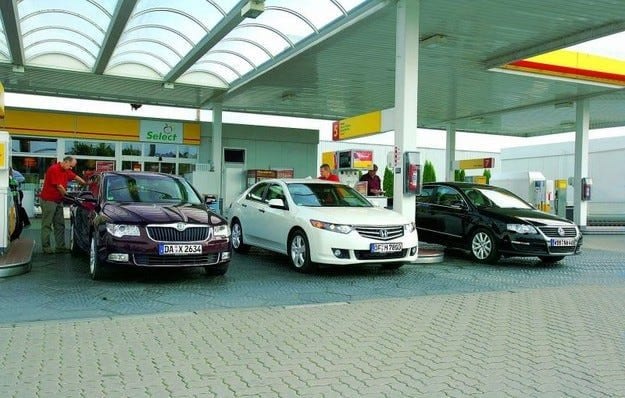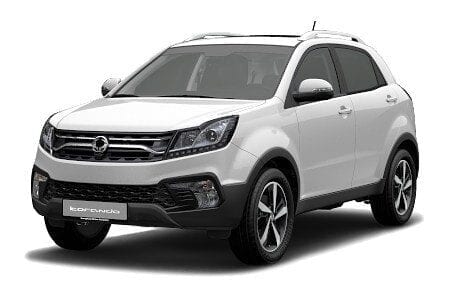
Honda Accord 2.0, Skoda Superb 1.8 TSI, VW Passat 1.8 TSI: central strikers
Content

The middle class is constantly growing - both literally and figuratively. The largest in this segment so far is Skoda Great, but will the Czech model be able to overcome its technology donor VW Passat and the brand new Honda Accord?
“A lot of noise for nothing” is a wonderful saying about cases where someone makes big promises without even keeping them. However, Skoda Superb is not the embodiment of this wisdom, on the contrary - although in fact it is the largest middle class in terms of external and internal dimensions, the model does not flaunt it unnecessarily. And the truth is that this car really has something to boast about in the rest - let's start with the cargo compartment up to 1670 liters, for example. This indicator significantly exceeds the new generation of Honda Accord, as well as a close relative of the VW concern - Passat, which has long established itself as a benchmark in its segment. And while both competitors are classic sedans, the Superb gives its owners the privilege of having a huge rear lid (without compromising its representative line).
Three bedroom apartment
In fact, using this special Czech creation requires a little extra effort on your part. Without them, the trunk lid opens in the classic way, characteristic of both Passat and Accord. The real trick can only be seen after performing a laborious procedure: first you need to press a small button hidden on the right in the main panel. Then wait for the electric motors to do their job and open the top of the "fifth door". When the third brake light stops flashing, the so-called Twindoor can be opened using the main button. Really impressive performance - given the style, you can't assume that this car has such a property. Undoubtedly, loading through the huge lid is much easier and more convenient. The only question that remains is why this option to open the trunk is not standard, instead of this annoying wait. Otherwise, when removing the bark above the trunk, the Superb allows even tall, unconventionally shaped objects to be moved smoothly. In Accord and Passat, despite the presence of folding rear seats, luggage options remain much more modest. In addition, Honda's cargo volume is about 100 liters less and at the same time more difficult to access. Under the back cover of the Japanese model, you will find a whole bunch of folds, protrusions and dents - in the narrowest part of the barrel, the width is only half a meter.
And if in terms of cargo volume Superb we can say that it is ahead of its competitors by the chest, then in terms of free space for passengers, the differences become cardinal. If you want a seat in the rear seats comparable to that of a Skoda, you will have to look for a car in the two categories above. In fact, our measurements show that you will have to order the Mercedes S-Class in the extended wheelbase version, which gives more legroom than the Superb. In addition, large doors provide extremely convenient access to the attractive seating area.
On the road
The Passat, which is five centimeters shorter than the wheelbase, also has ample legroom for rear passengers. But the feeling of bliss is not so strong here. As for the Accord, while it has an identical wheelbase to the Passat, the Japanese car offers quite modest rear room, and the seats themselves are sparsely upholstered and set too low. Even the front seats have plenty of room, but the dominant dashboard and powerful center console make the driver and passenger a little uneasy. The seats provide excellent lateral support for the body, but the lower backrests are a little uncomfortable for long journeys.
Honda's comfortable suspension scores points against Skoda and VW with smooth handling of short, sharp bumps such as manhole covers or cross joints. When cruising on the highway, the two European models are fantastically stable, but they also show a bit of a confident ride. In all other circumstances, however, their chassis is much more balanced than the Accord's - especially with the wavy road profile, the Honda tends to wobble.
Superb and Passat are also more balanced in terms of road behavior. Since technically they are almost twins, it is only natural that the differences between them are more of a nuance. Both cars spontaneously follow the commands of the steering wheel, and their masses and sizes are almost not felt. However, the Passat has a slightly more dynamic character - its reactions are even more direct and sporty than those of the Superb. Once again, the VW Group's electromechanical control has proved to be one of the most advanced systems in the middle class. Honda's steering system, which works on the same principle, is pleasantly direct, but it lacks perfect road feedback in medium mode, and the driver often has to make additional adjustments to the trajectory in corners with a change in direction. When cornering at higher speeds, the Accord frankly starts to understeer and slides on the outer tangent to the corner, and the presence of bumps further exacerbates this tendency. While ESP intervention in Skoda and VW is rare and so subtle that it can usually only be noticed by a flashing dashboard warning light, the Accord's electronic guardian angel turns on in much milder situations and continues to work actively even after being overcome at a moment of risk .
1.8 with forced filling or 2 liters of atmosphere
The brothers in the concern are ahead of Honda in many other ways. Dynamic measurements show significant differences, although on paper the Honda is only four horsepower weaker. There's a logical explanation for this - the Superb and Passat are powered by a finely tuned 1,8-litre turbo engine that's definitely one of the best in its category. With a solid maximum torque of 250 Nm at an impressive 1500 rpm, the unit delivers powerful and even traction. Acceleration occurs immediately after acceleration (including in certain situations, such as exiting tight corners), without even a hint of reflection, as we are accustomed to encounter in most lamps. In addition, the modern petrol engine combines reliable traction with good handling and easy cornering.
Unfortunately, the naturally aspirated engine under the Accord's hood can boast only the latter - typical of the brand, it quickly and enthusiastically gains momentum. But with a modest 192Nm at 4100rpm, its pulling power is rather slow, and despite having shorter gear ratios, the elasticity test results feel mediocre compared to its opponents. The acoustics of the two-litre engine are restrained, although its voice becomes clearer with increasing speed. However, Honda has largely made up for its impressively low fuel consumption, with its model consuming about one liter per 100 kilometers less than its opponents.
And the winner is ...
The new Superb won plaudits in this test and climbed to the top of the last rung of the ladder, beating even its prestigious technology counterpart. In fact, this is not surprising - the car has the same advantages as the Passat (excellent road holding, good comfort, solid quality), similar disadvantages, such as poor braking results on uneven surfaces (μ-split). In addition, Skoda is much better equipped and cheaper to maintain than VW, and a great interior is a separate issue. This time, the Accord has no chance against such a strong European duo - which is mainly due to more disharmonious driving behavior and weak engine elasticity.
text: Hermann-Josef Stapen
a photo: Karl-Heinz Augustine
Evaluation
1. Skoda Superb 1.8 TSI - 489 points
Superb offers a remarkable combination of generous interior space, thoughtful functionality, harmonious driving, balanced handling and excellent driving comfort - all at a good price.
2. Volkswagen Passat 1.8 TSI - 463 points
Aside from the slightly narrower interior, with one idea of sportier road behavior and better dynamic performance, the Passat is almost identical to the Superb. However, with poor standard equipment, it is too expensive.
3. Honda Accord 2.0 – 433 points
The low fuel consumption, wasteful standard equipment and favorable purchase price are unfortunately insufficient for the Accord to overcome the concerns about engine flexibility and road behavior.
technical details
| 1. Skoda Superb 1.8 TSI - 489 points | 2. Volkswagen Passat 1.8 TSI - 463 points | 3. Honda Accord 2.0 – 433 points | |
|---|---|---|---|
| Working volume | - | - | - |
| Power | 160 k. From. at 5000 rpm | 160 k. From. at 5000 rpm | 156 k. From. at 6300 rpm |
| Maximum torque | - | - | - |
| Acceleration 0-100 km / h | 8,7 with | 8,3 with | 9,8 with |
| Braking distances at a speed of 100 km / h | 39 m | 39 m | 39 m |
| full speed | 220 km / h | 220 km / h | 215 km / h |
| Average consumption fuel in the test | 9,9 l. | 9,8 l | 9,1 l |
| Base Price | 41 980 levov | 49 183 levov | 50 990 levov |
Home " Articles " Blanks » Honda Accord 2.0, Skoda Superb 1.8 TSI, VW Passat 1.8 TSI: central strikers
